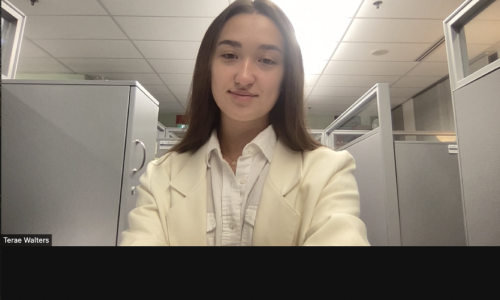
The E-Word Blog is a series that features a student perspective on SFU’s various engagement opportunities. Follow our blogger Christina as she tries all that SFU has to offer in her effort to become “truly engaged”.
It’s a standard piece of advice that we all tend to ignore, but time and time again, professors will tell you: “You should come to office hours.”
Trust me, I know. During my first two years here, that thought had never even crossed my mind. Firstly, professors are scary and powerful. Secondly, I don’t want to waste their time… I have nothing to offer them, right?
Well, for the sake of ‘blogging my way through SFU’, this past summer, I faced my fear and attended my TA’s office hours for the first time.
Now I warn you, it wasn’t easy. I’m the type of person that tends to avoid confrontation at all costs, so mustering up the courage to go talk to my TA was no small feat. In fact, I even circled around the hallway twice before knocking on the door. I’m glad I did though, because what I learned was this: going to office hours is an incredibly valuable experience that all of you should take advantage of. In just a short fifteen minute span, I spoke to my TA Julia and picked her brain about the importance of building a connection with your professors and TAs. I carried her advice with me throughout the summer semester, and now, I’m a true advocate for attending Office Hours. Here’s how that one visit impacted my semester, and why I am now a believer:
1. Getting to know your TA gives you a sense of accountability.
One of the things Julia said that really resonated with me was that a more direct relationship with your TA compels you to put more effort into the class. I can completely confirm this. As silly as it sounds, I worked harder every tutorial to participate and put more effort into my assignments because I was scared of disappointing her. The end effect is you are more motivated to succeed in your class, which is definitely a good thing.
2. Going to office hours will give you a clearer sense of direction.
You know how a lot of the time, frustrations arise from the fact that we’re not mind readers? Misunderstandings come up because we expect others to know what we want, when we want it and why – without us even saying a word. Our relationships with TAs work in a similar way. Why did you get a C- on this paper that you spent hours on? Maybe it’s because you never clarified what an A meant to your TA in the first place. Meeting Julia during that first week really helped me get a sense of her expectations and what she wanted out of her students. With that in mind, I was able to adjust my writing and tutorial behaviour accordingly.
3. Your professors and TAs are a valuable resource!
It’s true: sometimes, you’ll find it hard to believe that your professors and TAs were once students just like you. This means they likely know exactly what you’re going through – whether it’s the uncertainty of your future career or just the stress of university in general. What this means is they have a very valuable reservoir of tips and advice. Julia got her undergraduate degree from SFU too and is now working her way towards a PhD… Hearing about her journey and her experiences post-graduation was very reassuring, and helped give me a new perspective on not only my degree, but what happens after too.
So what am I trying to say? In short, I know that going to Office Hours may seem scary, time-consuming, pointless, etc. Trust me, I used to subscribe to that train of thought too. What I think is important though is that you give it a chance. There’s a common misconception out there that getting “engaged” just means joining clubs and volunteering on campus. What can get overlooked is that engagement also means taking full advantage of all the amazing opportunities our school provides. So here’s my challenge to you: go visit your TA or professor in their office, even if it’s just to say hi. With midterm season in full swing, you have the perfect excuse!
Until next time,
Christina















